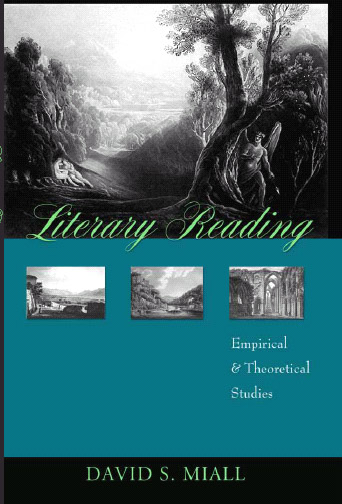Literary Reading: Empirical and Theoretical Studies
New York: Peter Lang, August 2006
ISBN 978-0-8204-8647-7
 This is the first major book in English on literary reading to be based on empirical methods. Moving the focus away from interpretation to the experience of literary texts, the studies demonstrate the role played by feeling in readers’ responses, showing how feeling performs important functions during reading that cannot be accounted for by cognitive understanding. The studies not only reinvigorate the concept of literariness, they are also thoroughly interdisciplinary, offering a coherent approach to literary reading that draws on literary theory, psychology, neuropsychology, and evolutionary psychology. Several chapters help to introduce the empirical approach for students.
This is the first major book in English on literary reading to be based on empirical methods. Moving the focus away from interpretation to the experience of literary texts, the studies demonstrate the role played by feeling in readers’ responses, showing how feeling performs important functions during reading that cannot be accounted for by cognitive understanding. The studies not only reinvigorate the concept of literariness, they are also thoroughly interdisciplinary, offering a coherent approach to literary reading that draws on literary theory, psychology, neuropsychology, and evolutionary psychology. Several chapters help to introduce the empirical approach for students.
Based in part on previously published work -- includes several new chapters -- for the student of empirical studies Chapters 3 and 7 provide an introduction to the field.
Contents
1. Introduction: Feeling, Literariness, the Reader
Part 1: Becoming Empirical
2. On the Necessity of Empirical Studies of Literary Reading
3. Experimental Approaches to Readers’ Responses to Literature
4. Interpretation, Cognition, Feeling
5. Feeling in the Comprehension of Literary Narratives
6. Feelings in Literary Reading: Five Paradoxes
7. The Empirical Approach: A Survey and Analysis
Part II: Contexts of reading
8. Episode Structures in Literary Narratives
9. Literariness: Are There Neuropsychological Indicators?
10. The Body in Literature: Metaphor and Feeling
11. Sounds of Contrast: An Empirical Approach to Phonemic Iconicity
12. An Evolutionary Framework for Literary Reading
Appendix: Chopin, "The Story of an Hour"
References
Index
For further information, ordering, etc., see this page at www.peterlang.com
return to Miall home page
Document created June 24 2006 / revised May 9th 2008
 This is the first major book in English on literary reading to be based on empirical methods. Moving the focus away from interpretation to the experience of literary texts, the studies demonstrate the role played by feeling in readers’ responses, showing how feeling performs important functions during reading that cannot be accounted for by cognitive understanding. The studies not only reinvigorate the concept of literariness, they are also thoroughly interdisciplinary, offering a coherent approach to literary reading that draws on literary theory, psychology, neuropsychology, and evolutionary psychology. Several chapters help to introduce the empirical approach for students.
This is the first major book in English on literary reading to be based on empirical methods. Moving the focus away from interpretation to the experience of literary texts, the studies demonstrate the role played by feeling in readers’ responses, showing how feeling performs important functions during reading that cannot be accounted for by cognitive understanding. The studies not only reinvigorate the concept of literariness, they are also thoroughly interdisciplinary, offering a coherent approach to literary reading that draws on literary theory, psychology, neuropsychology, and evolutionary psychology. Several chapters help to introduce the empirical approach for students.